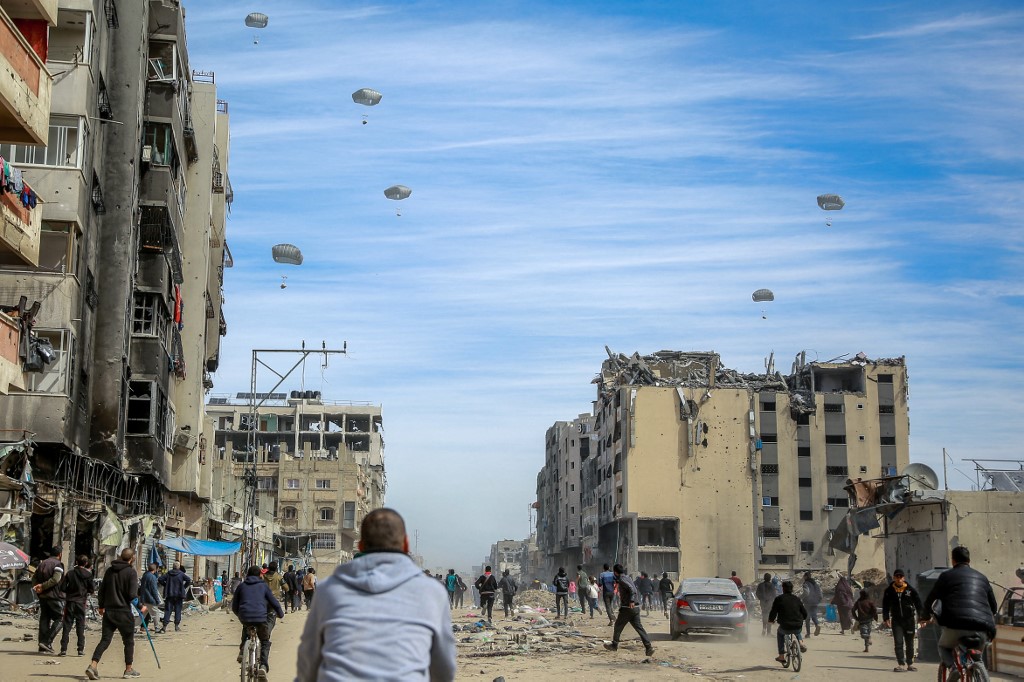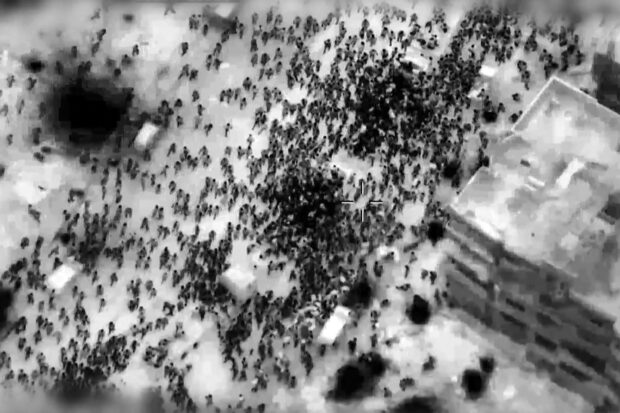‘Last resort’: Donors hope to offer Gaza lifeline with air drops

Palestinians run along a street as humanitarian aid is airdropped in Gaza City on March 1, 2024, amid the ongoing conflict between Israel and the Hamas militant group. For months, aid workers have warned of an increasingly desperate situation for Gazan civilians, and on February 26 an official from the UN humanitarian office OCHA said widespread starvation was “almost inevitable”. (Photo by AFP)
Palestinian Territories — With the humanitarian situation in Gaza increasingly desperate, the United States said Friday that it would join some of its Arab and European allies in delivering emergency relief from the sky.
The amount of aid brought into the territory by truck has plummeted during nearly five months of war, and Gazans are facing dire shortages of food, water and medicines.
READ: Israeli troops fire on Gaza crowd at aid point, 104 killed
A frenzied scramble for food from a truck convoy delivering aid to northern Gaza left more than 100 people dead on Thursday, according to the Hamas-run territory’s health ministry, after Israeli forces opened fire on the crowd.
With most aid convoys halted, some foreign militaries have air-dropped supplies to Gaza instead, sending long lines of aid pallets floating down into the war-torn territory on parachutes.
Article continues after this advertisementJordan has been conducting many of the operations since war broke out on October 7, with the support of countries including Britain, France and the Netherlands.
Article continues after this advertisementEgypt sent several military planes on an air drop Thursday together with the United Arab Emirates.
And President Joe Biden said Friday that Washington would start to air drop supplies into Gaza “in the coming days”.
READ: US considers airdropping aid into Gaza as land deliveries slow
Imad Dughmosh from Al-Sabra in central Gaza told AFP he managed to get some food and water from the aid drops, but there hadn’t been enough for everyone waiting.
“In the end, I took bags of pasta and cheese, but my cousins were not able to get anything,” the 44-year-old said.
“I was happy because I took some food for the children, but it was not enough.”
Humanitarian crisis
Deliveries into Gaza have been reduced to a trickle since the war began on October 7 with an unprecedented Hamas attack on southern Israel that resulted in the deaths of about 1,160 people, mostly civilians, Israeli figures show.
Israel’s retaliatory offensive against Hamas has killed 30,228 people, mostly women and children, according to the health ministry.
In northern Gaza, where Israel began its ground operation, many residents have been reduced to eating animal fodder.
Ten children have died of “malnutrition and dehydration”, the health ministry said Friday.
As well as the risks of dropping parcels onto crowded camps and cities, residents of the coastal territory told AFP many aid pallets had ended up in the Mediterranean.
“Most of the aid fell into the sea today, and also the parachutes that fell on Thursday and Wednesday all fell into the sea, except for a very small number,” said Hani Ghabboun, who lives in Gaza City with his wife and five children.
He said Gazans need “hundreds of tonnes of aid to confront the famine and feed the people.”

This image grab from a handout video released by the Israeli army on February 29, 2024, shows what the army says are Gazans around aid trucks in Gaza City. Israeli forces shot dead 104 people when a crowd rushed towards aid trucks on February 29, the health ministry in Hamas-run Gaza said. Israeli sources confirmed that troops opened fire at Palestinians rushing toward aid trucks in Gaza, with one saying soldiers thought they “posed a threat” to troops. (Photo by Aline MANOUKIAN / Israeli Army / AFP)
‘Extremely challenging’
Jens Laerke, spokesman for the UN humanitarian office OCHA, said Friday that there were “many issues” with air drops, which are better for small, specific missions.
“Aid that comes in in that way is a last resort,” he said, adding that it was “not the solution that we prefer” for Gaza.
“Overland transfer is simply better, more efficient, more effective and less costly.”
But he warned: “If something doesn’t change, a famine is almost inevitable on the current trends.”
The United Nations has accused Israeli forces of “systematically” blocking access to Gaza, which Israel denies.
But Biden said on Friday that he would “insist” Israel let in more convoys by land. “No excuses, because the truth is aid flowing to Gaza is nowhere near enough.”
He also said the United States would study a possible “marine corridor” to deliver large amounts of supplies into Gaza.
Aid groups, including the UN agency for Palestinian refugees UNRWA, say safe road convoys are the best solution for the scale of need in Gaza.
A spokesman for the UN chief Antonio Guterres told reporters that nearly 1,000 trucks are waiting at the Egyptian border and ready to move.
“Air drops are extremely challenging,” Stephane Dujarric said at a briefing this week. “(But) all options remain on the table”.
Air drops can also be expensive.
Jeremy Konyndyk, president of Refugees International, said air drops can only “help on the margins”.
One plane can deliver the equivalent of two truckloads of aid, but at 10 times the cost, he told the BBC World Service on Friday.
“Rather than dropping food from the air, we should be putting immense pressure and using leverage on the Israeli government to allow aid in through more traditional channels that actually deliver at scale.”